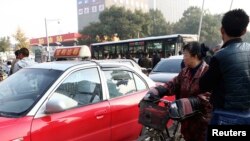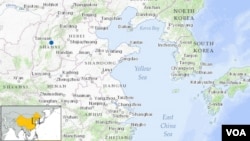A series of small explosions have taken place outside a local Communist Party office in northern China, killing one person and wounding eight others.
Officials in Shanxi province are quoted as saying the apparently homemade bombs went off early Wednesday in Taiyuan. Ball bearings and nails, typically used to maximize damage to people in a bomb's blast radius, were found scattered at the scene.
One witness told Xinhua he was waiting at a traffic light in front the building when saw a minivan explode. Others reported hearing as many as seven blasts. Pictures on social media showed multiple vehicles with minor damage, such as windows blown out.
The incident comes just over a week after a deadly car crash and explosion in Beijing's Tiananmen Square, which the government has called a terrorist act and blamed Muslim separatists.
But Human rights activist Deng Taiqing, who lives in Taiyuan, said in an interview with VOA's Mandarin service that while the government will place blame where it wants to, calling the new incident a terrorist attack is unlikely.
"To name the incident another terrorist attack does no good because Shanxi is in the heartland of China," Deng said in translated comments. "If it was a terrorist act, the attackers would have chosen Beijing, Shanghai, Guangzhou or Shenzhen, which are international cities, rather than Taiyuan, a second tier city, to make a point."
When asked whether the two cases were related, Chinese foreign ministry spokesman Hong Lei said police are not sure.
"Regarding the incident in Shanxi today, the Chinese police are still investigating it. We have determined the nature of the violent and terrorist incident on the Tiananmen Square a few days ago," Hong said
In the Beijing incident, officials say three people from the troubled northwest region of Xinjiang ran a car into a group of tourists and set their vehicle on fire. All three people inside the vehicle and two tourists died. Dozens were wounded.
Xinjiang is home to the mostly Muslim Uighur ethnic group, which often complains of religious and cultural persecution by the government. Clashes between Uighurs and majority Han Chinese or security forces sometimes occur, incidents Beijing refers to as terrorism.
But Wednesday's explosion also bore similarities to past attacks by Chinese petitioners from across the country who sometimes target government buildings in an attempt to have their grievances heard.
Johan Lagerkvist, a senior research fellow in the East Asia Program at the Swedish Institute of International Affairs, said in an interview with VOA that thousands of such protests take place every year across China.
"They are mostly peaceful: people stage a sit-in or protest in front of a symbolic building. But when it comes to violent incidents, like the setting off of bombs and that kind of thing, they are pretty seldom. That seems to be an indication of growing tensions in Chinese society."
Lagerkvist also points out Taiyuan was the site of violent protests last year, when striking workers who were complaining over low pay and poor conditions forced the closure of a Foxconn factory that made Apple products.
Officials in Shanxi province are quoted as saying the apparently homemade bombs went off early Wednesday in Taiyuan. Ball bearings and nails, typically used to maximize damage to people in a bomb's blast radius, were found scattered at the scene.
One witness told Xinhua he was waiting at a traffic light in front the building when saw a minivan explode. Others reported hearing as many as seven blasts. Pictures on social media showed multiple vehicles with minor damage, such as windows blown out.
The incident comes just over a week after a deadly car crash and explosion in Beijing's Tiananmen Square, which the government has called a terrorist act and blamed Muslim separatists.
But Human rights activist Deng Taiqing, who lives in Taiyuan, said in an interview with VOA's Mandarin service that while the government will place blame where it wants to, calling the new incident a terrorist attack is unlikely.
"To name the incident another terrorist attack does no good because Shanxi is in the heartland of China," Deng said in translated comments. "If it was a terrorist act, the attackers would have chosen Beijing, Shanghai, Guangzhou or Shenzhen, which are international cities, rather than Taiyuan, a second tier city, to make a point."
When asked whether the two cases were related, Chinese foreign ministry spokesman Hong Lei said police are not sure.
"Regarding the incident in Shanxi today, the Chinese police are still investigating it. We have determined the nature of the violent and terrorist incident on the Tiananmen Square a few days ago," Hong said
In the Beijing incident, officials say three people from the troubled northwest region of Xinjiang ran a car into a group of tourists and set their vehicle on fire. All three people inside the vehicle and two tourists died. Dozens were wounded.
Xinjiang is home to the mostly Muslim Uighur ethnic group, which often complains of religious and cultural persecution by the government. Clashes between Uighurs and majority Han Chinese or security forces sometimes occur, incidents Beijing refers to as terrorism.
But Wednesday's explosion also bore similarities to past attacks by Chinese petitioners from across the country who sometimes target government buildings in an attempt to have their grievances heard.
Johan Lagerkvist, a senior research fellow in the East Asia Program at the Swedish Institute of International Affairs, said in an interview with VOA that thousands of such protests take place every year across China.
"They are mostly peaceful: people stage a sit-in or protest in front of a symbolic building. But when it comes to violent incidents, like the setting off of bombs and that kind of thing, they are pretty seldom. That seems to be an indication of growing tensions in Chinese society."
Lagerkvist also points out Taiyuan was the site of violent protests last year, when striking workers who were complaining over low pay and poor conditions forced the closure of a Foxconn factory that made Apple products.
This report was produced in collaboration with VOA's Mandarin service.





